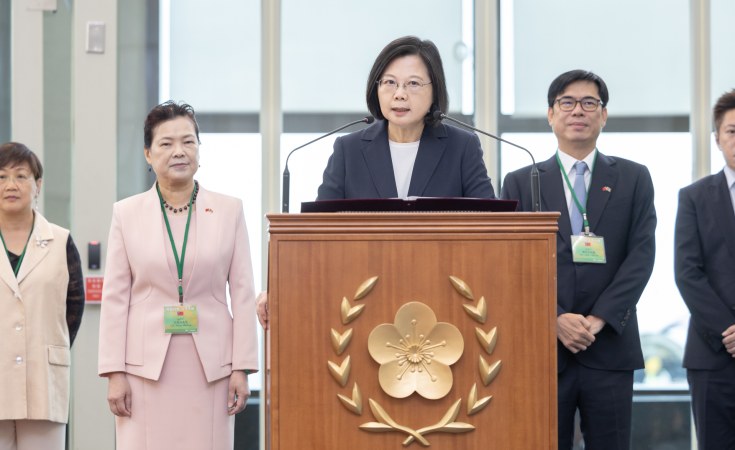On Tuesday, 5 September, Taiwanese President Tsai Ing-wen will visit Eswatini, Taipei's only remaining diplomatic ally in Africa. Meanwhile, Beijing's political influence on the continent continues to grow.
Tsai will head to Eswatini on 5 September, and attend celebrations marking the African nation's independence day and King Mswati III's birthday during the visit, her spokeswoman Olivia Lin said.
She will hold a meeting with the king, visit a local hospital and Taiwan-sponsored projects before returning to Taipei on 8 September.
Eswatini, formerly known as Swaziland, is among only 13 countries world-wide that diplomatically recognise Taiwan (officially "Republic of China") over the communist- ruled People's Republic of China, which claims the self-ruled island as one of its provinces.
In Africa, besides the embassy in Eswatini, Taiwan has only three "representative offices," in South Africa, Somaliland, and Nigeria.
Eswatini, Taiwan's last hope in Africa
The Kingdom of Eswatini, formerly Swaziland, is an absolute monarchy. The current head of state is King Mswati III, who ascended to the throne in 1986. The king appoints the prime minister and a minority of legislators to both chambers of the Libandla (parliament).
The country, landlocked between South Africa and Mozambique, gained full independence from the UK in 1968.
Taiwan quickly recognised Swaziland, leading to an unlikely alliance that has lasted half a century, and it has always withstood pressure from Beijing to switch sides.
In 2018 the then Taiwanese ambassador to Eswatini, Jeremy Liang, wrote in an open letter to the Times of Swaziland that "It is true China's financial promises glitter like gold in the midday sun," pointing out that "not all that glitters is gold."
Highways, ports and railways built in 'partnership' with Chinese firms quickly become bankrupting burdens," he says. "In no time, they are handed back to China and take on a new function as conduits for efficiently exporting a country's natural resources and importing low-quality goods and cheap labour," adding that "there is no question that China's debt-trap diplomacy, as African, Balkan and South Asian countries have quickly come to discover, is a one-way ticket to poverty and servitude" of Beijing.
As of 2019, it is the only country in Africa that maintains diplomatic relations with Taiwan.
"This is about optics and symbolism and maintaining the last remaining relationships that Taiwan has," Eric Olander, Editor of the China Global South Project, told RFI.
Beijing's largest diplomatic coup in the decades-old diplomacy war with Taiwan in Africa was when South Africa's ANC government switched relations to Beijing in 1998.
In the beginning of this century, Taiwan was left with diplomatic relations with only six African countries. But over the years, Beijing managed to snatch Liberia (2003,) Senegal (2005,) Chad (2006, ) Malawi (2008,) Gambia (2013) and Burkina Faso (2018) away from Taiwan. Eswatini is now Taipei's last remaining diplomatic foothold in Africa.
"The king has made it very clear that this relationship with Taiwan dates back decades, and he's not going to budge from it," according to Olander.
"He's very loyal to Taiwan, and there's no indication that any incentives from the Chinese would change that".
Beijing is not in a hurry to diplomatically convert Eswatini. In 2020, then Chinese Ambassador to South Africa, Lin Songtian still threatened Eswatini that if there were "no diplomatic relations" with Beijing, there would be "no business benefits," but since then, China seems to have toned down the pressure.
Africa's importance to China is not economic anymore. Africa's importance to China is political. - 07:11 INTERVIEW Eric Olander, Editor-in-Chief of the China Global South Project, Jan van der Made
"Their thought is that Eswatini will eventually switch [to Beijing,] according to Olander. But in the end, getting Eswatini in its diplomatic basket would be "very prized for China," he says, "because if China can say that it has the entire African continent that recognizes it, there is some symbolism to that."
And China uses other ways to close in. Landlocked Eswatini borders Beijing allies Mozambique and South Africa. While the countless "Belt and Road" projects in the region seem to be scaled down, China has started a new way to exert its influence: exporting its political model, which is based on one-party, authoritarian rule.
Enter the Mwalimu Juliu Nyerere Leadership School (MJNLS) in Tanzania, created and funded by China's Communist Party in 2022, the last in a series of Beijing's efforts to influence Africa's leading class.
According to its official website, the MJNLS was jointly established by the former rebel groups that were nurtured by Beijing during colonial times, but which have now become ruling parties.
They come together in the Former Liberation Movements of Southern Africa (FLMSA) and include Tanzania's Chama Cha Mapinduzi (CCM), South Africa's African National Congress (ANC), the Mozambique Liberation Front (FRELIMO), Popular Movement for the Liberation of Angola (MPLA), Namibia's South West Africa People's Organisation (SWAPO), and the Zimbabwe African National Union- Patriotic Front (ZANU-PF).
According to Olander, the school is "indicative that China's governance model is of great interest in many African countries" with its idea of a party-led system "where the state is subservient to the ruling party."
"The ANC would love to see a future where the ANC is the equivalent of the Chinese Communist Party in the sense that it is the paramount power, and the state is subservient to that power," he says.
Overall, Beijing's attitude towards Africa seems to be shifting. Investment in the trillion-dollar infrastructural Belt and Road peaked in 2016 and has been steadily slowing down since. "Africa has become less important economically to the Chinese," says Olander; "its importance to China is political."
Africa "tends to vote in large blocks" when it comes to voting in large international organisations such as the UN or the WHO, which is crucial for Beijing to obstruct decisions by Washington it doesn't like, and, more importantly, to prevent Taiwan from ever re-entering the international stage in an official capacity.


